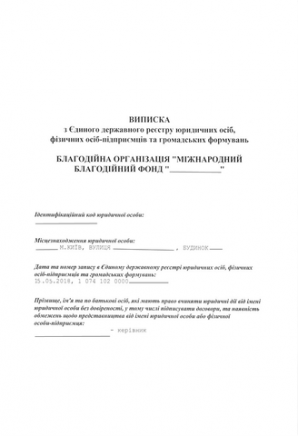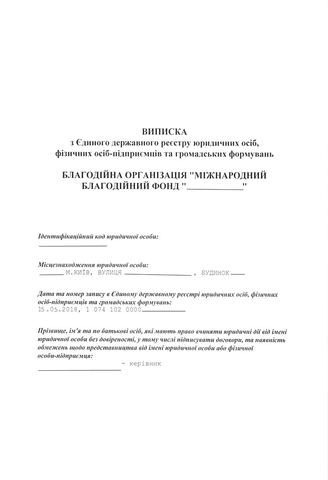Cash settlements in non-profit organizations: how to accept cash on the organization's balance sheet?
Cost of services:
Reviews of our Clients
One of the ways that non-profit organizations receive funds is through cash payments. However, many non-profit founders mistakenly believe that handling cash is easier than receiving financing in their checking account.
In this article, we will discuss the nuances of accounting for cash transactions and the primary restrictions that non-profit organizations may face when dealing with cash.
If you want to understand not just how to handle cash, but also who can help you with this process seamlessly, feel free to reach out to our specialists.
You may also like: How to Open a Bank Account for a Charitable Foundation in Ukraine?
Where should a non-profit organization start when organizing cash-handling procedures?
The rules for handling cash are determined by the cash discipline of the organization, which is regulated by the norms and provisions of the National Bank of Ukraine.
Note. The overwhelming majority of cash discipline rules are the same for both commercial organizations and non-profit organizations. We will discuss the differences below.
To obtain cash funds, a non-profit organization should:
1. Develop Regulations on cash discipline and Procedures for working with cash funds (receipt/disbursement).
2. Set up a cashier's workplace (a closed room with a safe).
3. Appoint a cashier or a responsible person for cash discipline (this function can be performed by the organization's manager or another authorized person).
4. Sign a contract for full material responsibility with the cashier.
5. Determine the limit of cash balance in the cash register.
You may also like: Agreement and Receipt: How to Confirm Receipt of Charitable Aid in Your Foundation's Documents?
How to properly handle cash donations to a non-profit or charity organization?
Non-profit organizations may receive cash donations in the form of:
- membership fees;
- charitable aid;
- donations;
- proceeds from the sale of goods or services.
Please note! All possible sources of funds must be documented in the organization's charter.
Receipt of cash funds should be recorded using a Receipt Cash Order, which should include the following information:
- Registration details of the non-profit organization
- The name of the person or entity making the cash donation
- The reason for the donation (e.g., charitable aid or contribution)
- The amount of cash received
Please note! When receiving cash donations, it's important to properly document the transaction by issuing a Cash Receipt Order. This should be done at the time of receiving the cash from the donor. The responsibility of creating these documents falls on the cashier, or in the absence of one, the director or chairman of the organization.
It's worth noting that if the plan is to use the received cash donations for organizational expenses on the day of receipt, the first step is to issue the Cash Receipt Order. Then, when it's time to use the funds, a Payment Order is created to record the transaction to confirm the transfer of funds.
As we mentioned earlier, non-profit organizations also need to determine a limit for the amount of cash that can be held in the cash register.
Any amount exceeding this limit must be deposited into the organization's bank account by the following morning.
How is the cash limit determined?
1. For recently created organizations, the cash limit is determined empirically.
2. For organizations that have been operating for more than 3 months, the limit is determined based on the average daily funds received over the past 3 months.
Exception: Religious organizations that do not engage in any production or entrepreneurial activities are not subject to cash limits or deadlines for cash submission.
The transfer of cash to the bank is recorded in an Expense Cash Order. Information about Profit and Expense Cash Orders is recorded in the organization's cash book.
You may also like: Accounting and Reporting Requirements for Charitable Foundations in Ukraine
When is it not necessary to deposit cash in the bank?
Cash can be left undeposited in the bank in the following situations:
- On payday when wages are paid in cash;
- When the cash is intended for compensation of travel expenses or other authorized expenses.
Please note! Cash received in donation boxes must be recorded in the organization's cash register just like any other cash. The only difference is that the name and location of the donation box are recorded in the Receipt Cash Order, instead of the name of the individual who made the donation.
You may also like: Establishing a Volunteer Organization Status in Ukraine
Do non-profit organizations need to use cash registers to record cash inflows into their cash register?
No, if you are recording membership fees, charitable donations, or other contributions.
Exception: If you sell goods or services to generate revenue that will be used to achieve the organization's goals, you must use a cash register.
Limits on the amount of cash
There are also limits on the amount of cash that can be received during the day. For non-profit organizations, the maximum amount of cash that can be received in a single day is:
- 50,000 UAH from an individual
- 10,000 UAH from a legal entity or individual entrepreneur
Note: There are no restrictions on the number of individuals or legal entities from whom charitable donations can be received in cash.
Exception: These daily cash payment limits do not apply to voluntary donations and charitable contributions.
How to account for the receipt of cash in foreign currency?
According to the current legislation in Ukraine, the official currency for settlements is the hryvnia. Acceptance of foreign currency cash deposits, donations, or any other forms of aid is prohibited on the territory of Ukraine.
So what can you do if you want to receive funding from a donor who wants to contribute in foreign currency cash?
Depending on the situation, our specialists can suggest the following options:
1) If the donor is a resident of Ukraine
- they can exchange the foreign currency and make the donation in the equivalent amount in hryvnia.
2) If the donor is a non-resident of Ukraine, the organization can
- record the funds in the cash register based on a cash receipt;
- prepare an act of acceptance of funds into the cash register when receiving funds from a resident legal entity on its account;
- transfer the foreign currency to a banking institution for deposit into a distribution account.
Please note! Under Ukrainian law, fines are imposed for violations of cash discipline:
- Failure to deposit cash into a bank within the designated time frame – from 289 UAH to 1496 UAH.
- Exceeding the maximum amount of cash transactions - first violation from 1700 to 3400 UAH; repeated violation from 8500 to 17000 UAH.
- Violation of the procedure for conducting cash transactions – first violation from 1700 to 3400 UAH; repeated violation from 8500 to 17000 UAH.
And of course, improper accounting and issues from regulatory bodies regarding the use of funds can lead to loss of non-profit status.
Handling complex issues related to cash, accounting, and managing various types of funding can be tackled alone with all the associated risks, or entrusted to experienced professionals to ease the burden.
Our company not only helps create non-profit organizations with different structures but also provides legal and accounting services for their further activity in Ukraine. Among our services are:
- Consulting on any issues related to conducting charitable or public activities in Ukraine
- Accounting and personnel support for non-profit organizations
- Opening and servicing accounts for non-profit organizations
- Development of basic document packages necessary for charitable and public organizations
- Representation of reports on the organization's work
- Assistance in organizing work with personnel and volunteers, including foreign volunteers, etc.
You can find the cost of our services here.
Don't take any risks, contact us! Get the opportunity to focus on your activities, not on legal issues.





